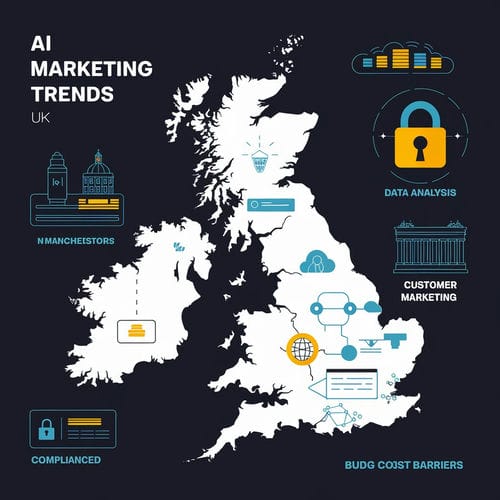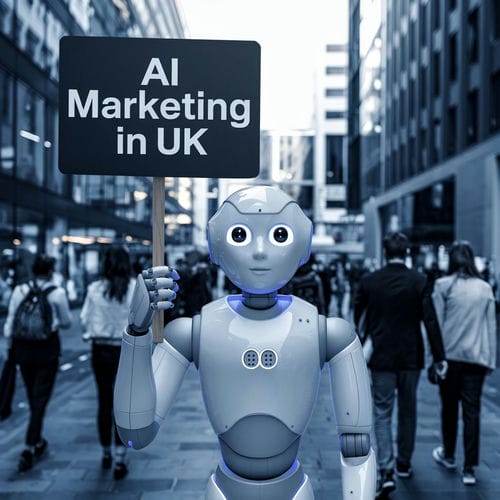With artificial intelligence taking over every industry, it’s no surprise that AI marketing in the UK is becoming a game changer. Having tools that analyze customer behavior, predict trends, and automate your marketing strategies can save you time and boost your results.
In a competitive market like the UK, staying ahead means adopting the latest tech, and AI is leading that charge. From London’s tech giants to innovative startups in Manchester and Birmingham, AI is shaping the way businesses interact with customers.
It’s not just about flashy algorithms; it’s about creating personalized experiences that drive real engagement. So, whether you’re a small business owner or part of a marketing team in a big corporation, understanding AI’s impact can give you the competitive edge you’ve been searching for.
Curious about how AI is transforming marketing strategies across major UK cities? Let’s dive into the trends that are shaping the future of marketing, and why you need to pay attention.
What is AI Marketing?
AI marketing is a process of applying Artificial Intelligence technologies in improving, automating and optimizing marketing processes. Such technologies as machine learning, natural language processing, and data analytics.
AI assists marketers to collect more information about consumers, engage in low-level operations, and provide individualized experiences in mass markets at once.
1. Key Components of AI Marketing
At its core, AI marketing relies on several critical components:
- Data Collection: Through collection and analyzing large amounts of data AI provides marketers with valuable insights into customers, choices, patterns and purchases.
- Machine Learning: AI Marketing analyzes the previous campaigns and makes calculations to enhance the performance of marketing in the future.
- Automation: Many operations like, email marketing, customer segmentation and ads placements are possible with the help of AI technology and thus they can be more effective and accurate.
2. Benefits of AI Marketing
AI marketing provides several benefits to businesses:
- Improved Personalization: AI helps deliver tailored content and product recommendations to individual users based on their browsing and purchasing history.
- Enhanced Decision-Making: Looking at the enormous data volumes in real-time, AI assists savvy marketers to make sound decisions regarding the approach and resource allocation for campaign.
- Increased Efficiency: It displaces manual efforts since it can always handle large volumes of work that once required human intervention; marketing departments will therefore be free to work on strategy and creativity.
Marketing with AI is changing the way marketers are reaching out to their customers.
Must Read:
- AI Marketing in the USA
- What is White Hat SEO (Search Engine Optimization)?
- What is SEO in Digital Marketing?
- What is SEO Writing?
- What is Local Search Engine Optimization?

Current AI Marketing in the UK
1. AI Adoption Rates
In the last few years, there has been an obvious increase in the employment of AI marketing within the UK. Industry reports indicate that over 60% of UK companies have started to include AI into their marketing plans.
Retail, finance, and technology companies, with big companies near the front, are showing the way. However, small and medium-sized companies are still making progress in their accessibility to AI.
2. Key Industries Leveraging AI
AI marketing is rapidly developing in numerous sectors throughout the UK. Retailers utilize AI for customized shopping situations and to handle inventory more proficiently. AI is being used by financial institutions to enhance customer segmentation and deliver better, targeted advertising.
The abilities of AI are being applied in the hospitality sector to improve customer relationships as well as increase customer satisfaction. Driving efficiency and engagement is the forefront of those industries at the head of AI adoption.
3. Challenges in AI Adoption
Even with its advantages, AI marketing finds obstacles in the UK. The leading obstacle is the expense connected with putting in AI technologies, which is a limitation for smaller business. There is another problem of an inadequate supply of experts skilled enough to oversee and maximize the value of AI technology.
The adoption of Artificial Intelligence (AI) by companies is complicated by the privacy issues and restrictive regulations of the GDPR, necessitating that they manage consumer data responsibly.
As the growth of AI marketing in the UK progresses, companies need to meet these challenges to remain competitive. In the following section, we’ll investigate how various cities are implementing AI trends in their marketing initiatives.
Must Read:
- How We Can Learn Search Engine Optimization?
- How to Optimize Website for Google Search Engine?
- Is Search Engine Optimization Worth it?
- How to Learn Search Engine Optimization?

AI Marketing Trends in Major UK Cities
Across the UK, artificial intelligence is altering the face of marketing, and every city is taking on unique trends based on current industry needs along with the latest technological improvements.
We investigate how AI is revolutionizing marketing and is significant in UK urban areas including London, Manchester, Birmingham, Edinburgh, Leeds, and Bristol. Appreciating these local trends assists businesses in staying current with the quickly evolving digital environment.
Related Articles:
- How to Earn Money by Search Engine Optimization?
- How to Become a Search Engine Optimization Specialist?
- How Does Search Engine Optimization Work?
- How to use Search Engine Optimization?
Personalization and Programmatic Advertising
1. AI-Powered Personalization
London companies are leading the way in using AI to create unique customer experiences. Marketers can use AI-driven platforms to analyze user behavior and preferences, giving them the ability to design personalized content and product suggestions. Essential for customer interaction and client loyalty, this has become important in the London market competition.
2. Programmatic Advertising
Another important trend that has been observed in London is programmatic advertisement. AI uses algorithms to purchase digital ads thus improving the positioning of the ads. Thus, using AI techniques, such as big data processing in real-time, marketers can fine-tune the ad spendings and achieve higher ROI in ad placements because the advertisement is being delivered to the targeted audience at the right time.

Creative AI and Data-Driven Marketing
1. AI in Creative Content Generation
Manchester is one of the leading cities for creative industries and AI is now being used to help revolutionize content marketing. More and more, marketers are harnessing the power of AI for content creation in text, images, and video. These tools help marketers to understand the trends and preferences of the audience thus creating content that will attract the audience.
2. Data-Driven Decision-Making
AI-based data analytics is revolutionizing the marketing strategies in Manchester. Marketers are leveraging on AI to analyze big data on customers, which includes campaign, audience, and market data. Due to this approach, companies are now able to use data to improve their marketing strategies and make better decisions with the aim of producing the best outcome.

AI for SMEs and Marketing Automation
1. AI for Small and Medium-Sized Enterprises (SMEs)
In Birmingham, AI is now being applied in SMEs to counter big businesses. Due to the integration of artificial intelligence, small business marketers can benefit from effective marketing tools without having to hire several marketing personnel or spend a lot of money on marketing. From customer classification to automated communication, Birmingham’s SMEs are implementing AI to increase productivity and ROI.
2. AI-Driven Marketing Automation
Marketing automation is another trend in Birmingham, that is companies are using artificial intelligence to automate the marketing processes including the emails, leads, and customer profiling. With this automation, businesses can develop strategic approaches in their marketing yet at the same time can guarantee that the overall performance and management of their marketing is optimized.
3. AI-Powered Social Media Marketing
Social media is an essential part of marketing in Birmingham and AI is changing how companies interact with their consumers. AI helps organizations to find out the trends in social media, calculate the levels of audiences’ engagement, and improve the position of the content to increase audience interaction and to develop stronger brands.
AI in Financial Marketing and Customer Segmentation
1. AI in Financial Services Marketing
Edinburgh as a financial centre is witnessing the use of AI in marketing by banks and other financial services companies. AI is being used by these organizations to understand the customers and their requirements and to design the products and services that would be required by the customers soon. This enhances customer experience and enhances the performance of marketing strategies.
2. AI-Driven Customer Segmentation
The application of AI in the marketing industry of Edinburgh is revolutionizing the aspects of customer segmentation. Due to AI, companies can now process and analyze vast amounts of information to further categorize their customers. With the help of precise targeting of the campaigns to certain segments of customers, businesses increase the conversion and, consequently, the loyalty of the customers.
Retail Marketing and AI-Driven eCommerce
1. AI in Retail Marketing
Leeds a leading retail city in the UK is now using AI to improve the shopping experience. Many of the retailers are employing artificial intelligence to understand consumer behavior and suggest products to them. Real-time marketing strategies can be easily changed with the help of AI-based analysis and thus meet the customers’ needs.
2. Dynamic Pricing and Predictive Analytics
In eCommerce, companies in Leeds are applying artificial intelligence for dynamic pricing policies. The use of AI algorithms means that prices are reviewed based on competitor prices, customers’ needs and other variables to give real-time prices.
This helps businesses to stay competitive in the market and at the same time increase profitability. It also helps in the prediction of the customers’ future conduct and market trends as well as in making better marketing decisions.
AI for Sustainability and Customer Retention
1. Sustainable AI Marketing Practices
Bristol, a city that promotes sustainability, is witnessing companies integrating AI to make their marketing strategies sustainable. Some of the AI tools assist companies to monitor their environmental footprint and decrease the carbon footprint of their marketing strategies. This focus on sustainability is thereby providing a competitive advantage to the Bristol-based companies and attracting potential consumers.
2. AI for Customer Retention
Another important area in which AI is having a significant effect in Bristol is customer retention. Customer behavior is studied by AI tools to determine churn and potential customer disengagement. Understanding these factors, companies can create effective strategies for customer retention, for instance, offering special deals or creating loyalty programs.
The Future of AI Marketing in the UK
1. Increased AI Integration Across Industries
The future of AI marketing in the UK will be integrative as the technologies spread across different sectors. Retail, finance, health care, and even public sectors will further integrate AI in their marketing strategies as the AI technologies develop and become more affordable. This can involve greater segmentation, better analytics, and automation that goes beyond eliminating repetitive work so that marketers can concentrate on thinking and planning.
2. Enhanced Customer Experience Through AI
Customer experience will be greatly improved using AI. AI solutions are predicted to develop further and suggest better solutions, improve customer engagement, and respond in real-time across all channels.
Thus, such technologies as AI-powered chatbots will become even more efficient in answering sophisticated questions, providing more efficient and efficient customer service, and increasing the level of customer satisfaction.
3. Ethical and Legal concerns and Issues
With the integration of AI in marketing, there are likely to be raising ethical and legal issues that may impact marketing operations. More and more customers’ data are processed by AI, so the companies operating in the UK must follow the data protection laws, including GDPR.
Trust will be the new battleground, and only those brands that focus on the right use of AI will likely be trusted by consumers. It is therefore important for businesses to be as flexible as possible to keep up with the AI marketing of the future.
Implementing AI in Your Marketing Strategy
1. Assessing Your Business Needs
However, the adoption of AI in your marketing strategy begins with a needs analysis of your business. Define precisely those regions where AI could bring in the greatest added value, or where its use would be the most valuable – such as customer segmentation, content generation, or data analysis. It will assist you in identifying the right AI tools and solutions that fit your goals when you are marketing your business.
2. Choosing the Right AI Tools
Following the identification of needs, the next approach involves making the right choices of the AI tools. Fortunately, the marketing function has various platform options that it can make use depending on its need. For example, if one must increase customer retention or satisfaction, then chatbots or personalization applications being built on Artificial Intelligence should be preferred.
For data analysis, it is important to find systems that are equipped with the potential for predictive analysis and reporting. Make sure you review all the functions, know the experiences of other users, and evaluate how well each converter adapts to your existing IT environment.
3. Training and Integration
Implementation of AI also needs training that your marketing team receives to ensure its success. Organize detailed, thorough training meetings so that people know how to go about using the new tools in the best manner possible. Furthermore, apply AI solutions in the existing marketing workflows to level up your workflow. There will be a blend of teamwork with the members and AI technologies as a way forward to improving productivity.
4. Monitoring and Optimization
Last but not the least; track the efficiency of these intelligent tools repeatedly. Gather some information regarding their efficacy and change them if required. Routine optimization will assure the marketer that an AI marketing strategy is ready to update itself to match market conditions as well as consumer trends.
If such steps are taken, one can be sure that the application of advanced technologies in marketing promotion of a business will bring only benefits.
Challenges of AI Adoption in Marketing
1. High Implementation Costs
One of the primary challenges businesses face when adopting AI in marketing is the high implementation costs. Acquiring AI tools, integrating them into existing systems, and training staff can require significant financial investment. For small and medium-sized enterprises (SMEs), these costs can be prohibitive. Companies must carefully assess their budget and determine the potential return on investment before proceeding.
2. Skill Gaps and Training Needs
Another significant challenge is the lack of skilled professionals proficient in AI technologies. Many marketing teams may not have the expertise needed to effectively utilize AI tools. This skill gap can hinder the successful implementation of AI strategies. Businesses should consider investing in training programs to upskill their existing workforce or hiring new talent with relevant expertise.
3. Data Privacy Concerns
Data privacy and compliance with regulations, such as GDPR, pose additional challenges. As AI relies heavily on data, businesses must ensure they handle customer information responsibly. Failure to comply with data protection laws can result in severe penalties and damage to a brand’s reputation. Establishing clear data governance policies and practices is essential for maintaining customer trust.
4. Resistance to Change
Finally, Organization’s reluctance to accept new change initiatives affects the implementation of AI. Some employees can be reluctant to accept change brought about by AI because they might be laid off or they have no knowledge of what AI is.
To that end, there is the need for organizations to promote the culture of innovation and the realization that AI is more of an augmenting tool that reinforces human endeavor. Addressing these challenges is crucial for successful AI adoption in marketing.
Conclusion
AI marketing in the UK is reshaping the way businesses connect with their audiences. As companies embrace AI technologies, they can enhance personalization, optimize strategies, and improve customer experiences. However, overcoming challenges such as implementation costs and skill gaps is essential for success.
To stay ahead in this rapidly evolving landscape, businesses must adapt and leverage AI effectively. For further insights and training on integrating AI into your marketing strategies, visit Devtrain.co. Let us help you navigate the future of AI marketing and drive your business growth.



breeziest
SawNAqBw349
philanthropies
7bqgQ8MJdAV
imperdiet
5MaK4R3JIQF
tlover tonet
Enjoyed reading through this, very good stuff, appreciate it. “Hereafter, in a better world than this, I shall desire more love and knowledge of you.” by William Shakespeare.
alquileres en Montevideo
Wonderful website. Lots of helpful info here. I am sending it to a few pals ans additionally sharing in delicious. And certainly, thank you to your effort!
¿Qué es un granulador de plástico y un peletizador?
Wow! This blog looks just like my old one! It’s on a completely different subject but it has pretty much the same layout and design. Excellent choice of colors!
Authentic Scents exclusive perfumes
you have a great blog here! would you like to make some invite posts on my blog?
slot gacor terpercaya
I gotta bookmark this internet site it seems very beneficial very helpful
Casino Online ES
you are truly a excellent webmaster. The website loading velocity is incredible. It kind of feels that you are doing any distinctive trick. In addition, The contents are masterwork. you’ve performed a magnificent process in this topic!
bacbo
Undeniably consider that which you stated. Your favourite justification seemed to be on the net the easiest thing to consider of. I say to you, I definitely get irked while other people think about concerns that they just do not know about. You managed to hit the nail upon the top and also outlined out the whole thing without having side effect , folks could take a signal. Will likely be back to get more. Thank you
Dónde ir en Madrid este fin de semana
Saved as a favorite, I really like your blog!
Generador de horarios de clases online
hi!,I love your writing very much! percentage we keep up a correspondence more about your post on AOL? I need an expert on this area to solve my problem. Maybe that’s you! Looking forward to peer you.
telkom88 link alternatif
Very interesting info !Perfect just what I was looking for! “Water is the most neglected nutrient in your diet but one of the most vital.” by Kelly Barton.
Femipro Reviews
You actually make it appear really easy along with your presentation but I in finding this topic to be really one thing that I believe I’d never understand. It sort of feels too complicated and extremely vast for me. I’m looking ahead in your subsequent put up, I’ll try to get the dangle of it!
gullybet roulette
Hello. remarkable job. I did not imagine this. This is a great story. Thanks!
winshark casino willkommensbonus deutschland
Great blog right here! Additionally your website quite a bit up fast! What web host are you the usage of? Can I am getting your associate link to your host? I desire my web site loaded up as fast as yours lol
dmarket
Hi there! This post couldn’t be written any better! Reading through this post reminds me of my previous room mate! He always kept talking about this. I will forward this article to him. Pretty sure he will have a good read. Thank you for sharing!
olive oil trick for tinnitus
I just couldn’t depart your website prior to suggesting that I actually loved the usual info an individual supply for your guests? Is going to be again incessantly in order to inspect new posts
videochat de bazoocam
I got what you intend, thanks for posting.Woh I am delighted to find this website through google. “Food is the most primitive form of comfort.” by Sheila Graham.
farmasi spain
Farmasi España es mucho más que una simple tienda de cosméticos. Es la rama hispana de una empresa internacional que ha ido ganando fuerza con rapidez gracias a la calidad de sus productos, su modelo de negocio innovador y una comunidad creciente de usuarios y consultores apasionados. En los últimos 25 años, Farmasi ha expandido su presencia a nivel global, y su impacto en España ha comenzado a consolidarse como una marca confiable y con gran potencial.
得奇小说网
Such a thoughtful and thorough post! You covered all the key angles Ive been curious about, and your perspective is really refreshing.
fdertolmrtokev
Hello. splendid job. I did not anticipate this. This is a fantastic story. Thanks!
得奇小说网
Great read with such practical insightsyour tips are actionable and exactly what I needed. Ill definitely be applying these to my own projects soon.
Fiestas de Fin de Año
In the great scheme of things you actually secure an A just for effort and hard work. Where you confused me was in all the facts. As they say, details make or break the argument.. And that could not be much more correct at this point. Having said that, allow me say to you just what did give good results. Your text can be pretty powerful and this is possibly why I am taking the effort in order to opine. I do not make it a regular habit of doing that. Secondly, while I can certainly notice the jumps in reason you make, I am not necessarily sure of just how you appear to connect the ideas which make your final result. For right now I shall subscribe to your point however trust in the foreseeable future you connect the dots much better.
ver porno online
Woah! I’m really enjoying the template/theme of this blog. It’s simple, yet effective. A lot of times it’s very difficult to get that “perfect balance” between usability and appearance. I must say you have done a fantastic job with this. In addition, the blog loads extremely quick for me on Internet explorer. Superb Blog!